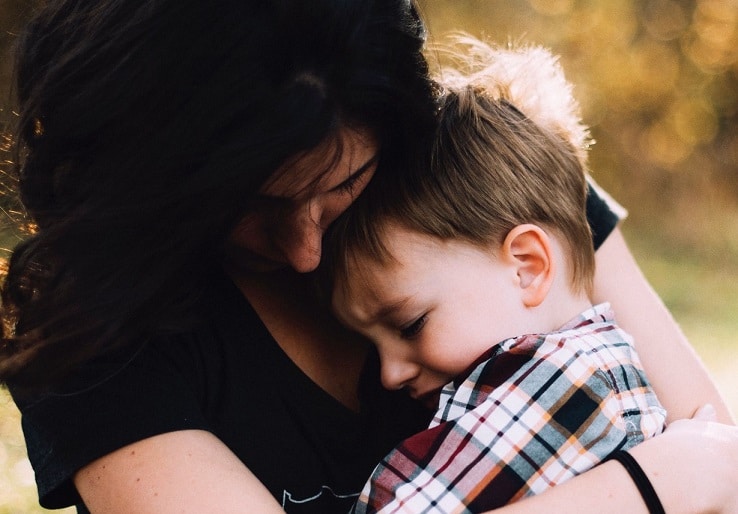School, moving, global pandemics, deployments — all of these things can have a massive mental, emotional and even physical impact on your kids. Young children especially can’t always understand the struggles they deal with or express their emotions when they’re dealing with something difficult, which makes it all the more important that you as a parent speak openly about life’s hardships with them.
Here are 10 tips for having tough conversations with your kids:
1. Remember to Listen
Whether you need to approach your child with bad news about an upcoming deployment, the death of a loved one or a necessary move — or if your child is approaching you with questions about something tough — active listening is a key component of tackling these heavy topics. Make it clear to your child that the conversation isn’t a lecture, it’s a dialogue. You’re there to listen to their thoughts and opinions, and answer their questions the best you can to ensure they’re seen and heard throughout these tough conversations.
2. Pay Attention to Their Feelings
When having difficult conversations with your kids, emotions can run high and many children, especially young ones, don’t fully know what to do with those negative feelings or how to react when they feel those emotions. This can then manifest in crying, screaming, tantrums, etc. It’s your job as a parent to help guide your child through their negative emotions. Let your child know that it’s okay to feel sad, scared, even angry, but also give them the tools and support to process those emotions in a healthy way.
3. Meet Them Where They Are
Tough conversations can be even tougher when it feels like you’re talking to someone who doesn’t understand your language — which, when having conversations with young children, is often the case. When having difficult conversations with your kids, meet them where they are. Talk about topics in contexts they’re comfortable with. For example, metaphors and analogies using their favorite characters or songs can sometimes simplify a complicated topic into words your child can better understand.
4. Welcome Questions
One of the best ways to make sure your kids are understanding what you’re saying and are processing your conversation properly is to fully welcome their questions. Let them know they can ask you anything, and if they think up a question later, they can come to you with it.
5. Focus the Conversation on What They Can Control
Lack of control triggers a lot of negative emotions in both children and adults, including fear, sadness, hopelessness, irritation and worry. Focusing your tough conversations on the lack of control in the situation will only make things worse.

Instead, focus on what your kids can control: how they take care of themselves, how they treat others, how they can be kind to their siblings, how they can write letters to their deployed parent or friends from old schools, etc.
6. Show Them Healthy Habits
Your kids are constantly watching you and learning from you and absorbing even when you think they aren’t paying attention. Think about the way you react to uncomfortable situations or bad news. Show your children that there are healthy ways to cope with negative emotions and that there are things they can do to feel better like dancing to your favorite song, cooking a nice meal, calling a loved one on the phone, etc. Kids learn how to react by mirroring you, so you can help mitigate negative reactions when having difficult conversations by setting that good example.
7. Don’t Lie
This might sound like it goes without saying, but it can be so easy to make things sound better than they are so your kids feel better. However, it doesn’t help your kids in the long run if you make promises you can’t keep. You can’t promise that their new school will be even better than the last, or that they’ll get to talk to their deployed parent whenever they want. Focus on the things that are true: “You are safe and you are loved,” “I’m here for you,” “We’re going to do our best,” etc.
8. Encourage Critical Thinking
When having tough conversations with your kids, it’s important that you answer all their questions and make them feel safe, but it’s also a good idea to help them think for themselves. Ask open-ended questions to help them consider your conversation more deeply. Try questions like, “What does this make you think?” or “How does this make you feel?”
9. Its Okay to Admit When You Don’t Know Something
While opening yourself up to questions is always good, don’t feel as though you must have the perfect answer to every question. Feel free to admit when you don’t know something, and let them know that you’ll try to find out. This teaches your kids that searching for the answers in difficult situations is normal and okay.
10. Keep the Door Open to Future Conversations
Once you’re finished giving them the bad news, let your kids go about their day and process in their own way — but keep the door open to future conversations.

They may come up with another question, have a different worry or find more information they want to talk to you about. Let them know that they can always come to you with tough stuff, and that you’ll do your best to help them understand the situation.
Military life isn’t always easy, especially for kids. Remember that being kind, loving and honest goes a long way and only makes your relationships with your children stronger.



